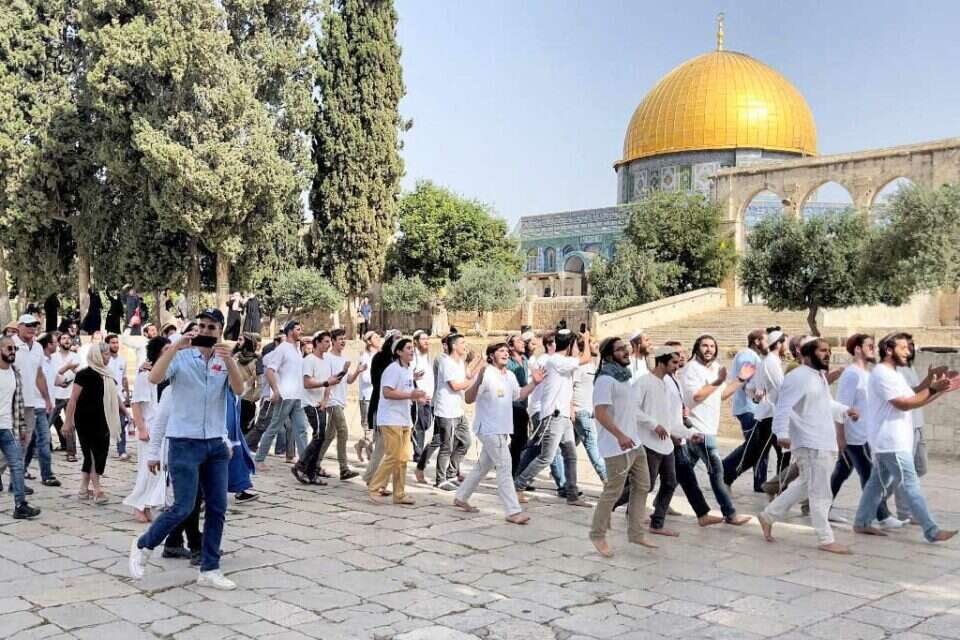On the morning of Wednesday, 28 Bayer 5777, June 7, 1967, the third day of the Six Day War, the soldiers of the paratrooper brigade under the command of Mota Gur broke through the Lions' Gate in the Old City of Jerusalem and liberated the Western Wall and the Temple Mount.
Before the battle began, Mota Gor broadcast a message over the communication network to his soldiers, which today would probably earn him a lot of criticism for being "messianic and delusional":
"We will be the first to enter the gates of the old city of Jerusalem, the city we dreamed of and longed for for generations. The Jewish nation awaits our victory. Israel is looking forward to this historic hour. Be proud."
At the end of the battle, Mota Gur reported on the social network with excitement that cannot be hidden: "The Temple Mount is in our hands, I am returning - the Temple Mount is in our hands."
Mota Gor also ordered two of his officers to hoist the Israeli flag on the Dome of the Rock mosque, an expression of Israel's sovereignty over Jerusalem and the mountain.
He even welcomed the representatives of the Muslim Waqf, who informed him that they accept the burden of the Israeli government and all they ask is that the sanctity of the mountain not be harmed.
But the joy over the liberation of the Temple Mount was premature.
Defense Minister Moshe Dayan ordered Mota Gur to take down the Israeli flag from the mosque and withdraw the IDF soldiers from the Mount. Later, on his recommendation, the government made a decision to remove any sign of Israeli sovereignty from the Temple Mount and return its management to the Waqf.
Dayan feared that the Muslim world would not accept an Israeli presence on the mountain, and that this would create constant friction between Jews and Arabs, which would stir up the spirits in the territories under its control.
The "Temple Mount" probably did not speak to him, and he tended to make light of its religious and national importance.
He also assumed that since religious Jews at that time avoided going up to the Temple Mount, it was a concession that the public could accept.
In retrospect, it was a historical miss, in terms of crying for generations, because in those historic moments in June 1967, Israel was able to dictate its terms and establish a new status quo in the mountain after its decisive victory in the war declared by the Arabs.
However, since then all Israeli governments have adhered to the principles established by Moshe Dayan.
Visitors of all religions were indeed allowed to go up to the mountain, but Jews were only allowed to enter through the Mughal Gate, and that too at pre-arranged hours and times, and they were also prohibited from praying and worshiping on the mountain.
Many of these governments lacked sensitivity and understanding of the importance of the Temple Mount and its centrality in Jewish existence - both religious and national - and as evidence, they were willing during the rounds of peace talks they conducted in recent decades to share control of the Temple Mount with the Palestinians or with countries such as Jordan and Saudi Arabia, or even completely relinquish control this and settle for the Western Wall.
What may have been possible and understandable in the days after the Six Day War, again "doesn't hold water".
Many in the Jewish public are no longer ready to put up with the reality and conventions of the past as if nothing had happened in the past decades, and it turns out that the Arab side is also not right to add and be content with religious management of the mountain, but draws encouragement from the hesitancy shown by Israel, and seeks to become the sole owner of the mountain.
And so, just as in the days of the Grand Mufti, Haj Amin al-Husseini, who made the question of the Temple Mount a central issue in his struggle for the Jewish settlement through which he gathered support and incited against the Jews, so today his successors seek to make the Mount a cornerstone in their struggle against Israel.
However, in all that has been said in the conduct of Israel's governments, nothing has changed since the days of the Mufti in the 1930s, as well as since the liberation of the Old City in June 1967. Israel refrains from standing on its own and refrains from loudly repeating the words of Mota Gur: "The Temple Mount in our hands".
were we wrong
We will fix it!
If you found an error in the article, we would appreciate it if you shared it with us

